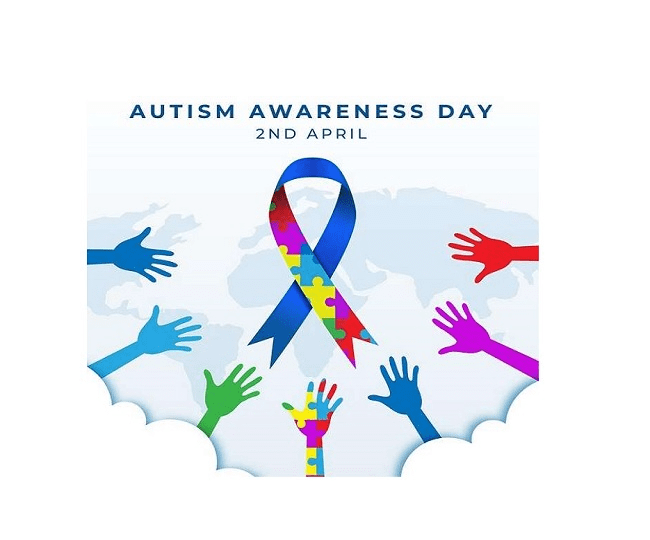April 2 is recognized as World Autism Awareness Day across the globe. With the rise in autism cases not just in India but all across the world, it is important to raise awareness, understand, and accept autism and autistic people.
April holds a special significance as it marks the beginning of Autism Awareness Month. At the forefront of this month-long campaign is World Autism Awareness Day, observed annually on April 2nd. As we delve into the significance of this day and its broader implications, it's crucial to understand the origins, themes, and activities surrounding autism awareness.

World Autism Awareness Day 2024 comes as part of a concerted effort to foster understanding, acceptance, and inclusion for individuals on the autism spectrum. This year, the theme revolves around "Celebrating Neurodiversity: Building an Inclusive Future." This theme underscores the importance of recognizing the unique strengths and talents of individuals with autism while advocating for a more inclusive society that accommodates their diverse needs.
The genesis of World Autism Awareness Day traces back to December 18, 2007, when the United Nations General Assembly unanimously declared April 2nd as a day to highlight the need to improve the quality of life of those with autism. This resolution aimed to promote awareness, understanding, and acceptance of autism spectrum disorder (ASD) globally. Since then, World Autism Awareness Day has become a pivotal platform for advocacy, education, and empowerment.
What Is Autism?
Autism, also known as autism spectrum disorder (ASD), is a complex neurodevelopmental condition that affects a person's social interaction, communication, interests, and behavior. It's called a spectrum disorder because it can manifest in a wide variety of ways and with varying degrees of severity, ranging from mild to severe.
Some common characteristics of autism include difficulties in social interaction, such as challenges in understanding and responding to social cues, maintaining eye contact, and engaging in reciprocal conversation. Communication difficulties may include delayed language development, trouble with understanding and using language effectively, and repetitive or unusual speech patterns.
Individuals with autism often exhibit repetitive behaviors or restricted interests, such as repeating certain actions or phrases, becoming intensely focused on specific topics, or adhering strictly to routines and rituals. Sensory sensitivities are also common, where individuals may be hypersensitive or hyposensitive to sensory stimuli such as sound, light, touch, or taste.

On this day, governments, organizations, and communities worldwide join hands to organize various events and activities to promote autism awareness and acceptance. From educational seminars and workshops to art exhibitions and fundraising campaigns, the spectrum of activities is as diverse as the individuals it seeks to support.
More News: top 10 daily news updates 2024
One of the most significant aspects of World Autism Awareness Day is the opportunity it provides for individuals on the autism spectrum to share their stories and perspectives. A poignant World Autism Awareness Day speech can shed light on the challenges faced by those with ASD while highlighting their unique strengths and contributions to society. Such speeches serve as catalysts for empathy, understanding, and action, inspiring communities to embrace neurodiversity wholeheartedly.
The essence of autism awareness lies in understanding its meaning beyond mere acknowledgment. It entails recognizing autism as a spectrum, encompassing a wide range of abilities, challenges, and characteristics. Autism awareness goes beyond passive recognition; it entails active engagement, advocacy, and support for individuals with autism and their families.
To truly embody autism awareness, communities engage in a myriad of activities aimed at fostering understanding and acceptance. These activities span from educational initiatives to sensory-friendly events, creating environments conducive to the needs of individuals with autism. By incorporating inclusive practices into everyday life, communities pave the way for a more accessible and accepting world for everyone.
Read More: Narendra Modi On Electoral Bonds Data
Autism awareness extends beyond a single day or month; it's a continuous journey of learning, advocacy, and empowerment. By promoting autism awareness year-round, societies can create lasting change and foster a culture of inclusion and acceptance for individuals of all neurodiversities.
As we commemorate World Autism Awareness Day 2024, let us reaffirm our commitment to celebrating neurodiversity and building an inclusive future for all. Through education, empathy, and action, we can create a world where individuals with autism are embraced for their unique gifts and talents, contributing to a richer and more vibrant society for generations to come.
Other Popular News Post:
Paris Olympics 2024 | Buddhadeb Bhattacharjee passed away | Breaking olympics | Hindenburg Research | Har Ghar Tiranga Certificate | Jagannath Rath Yatra | Mumbai Rain Today | Anant And Radhika Wedding | Mumbai rains | Anant -Radhika Wedding Updates | anant ambani wedding | Donald Trump Attempt | Porting Your Number to BSNL | Fire to TV Headquarters | Microsoft Cloud Outage | Amazon Prime Day
Explore other popular Posts:
Blog | News | Entertainment | Education | Sports |
Technology | Cryptocurrency | Stock | Home | Sitemap





